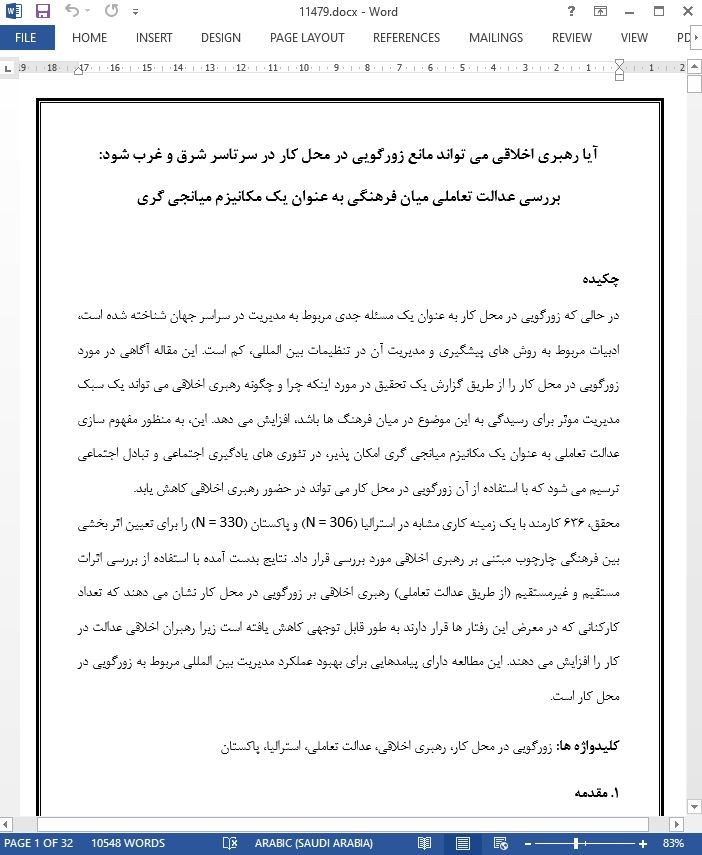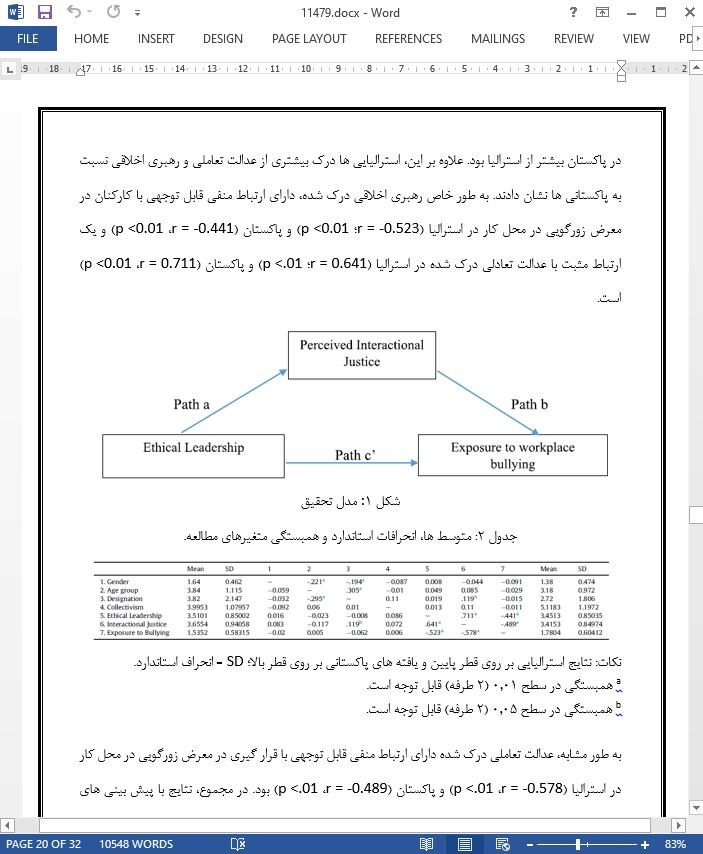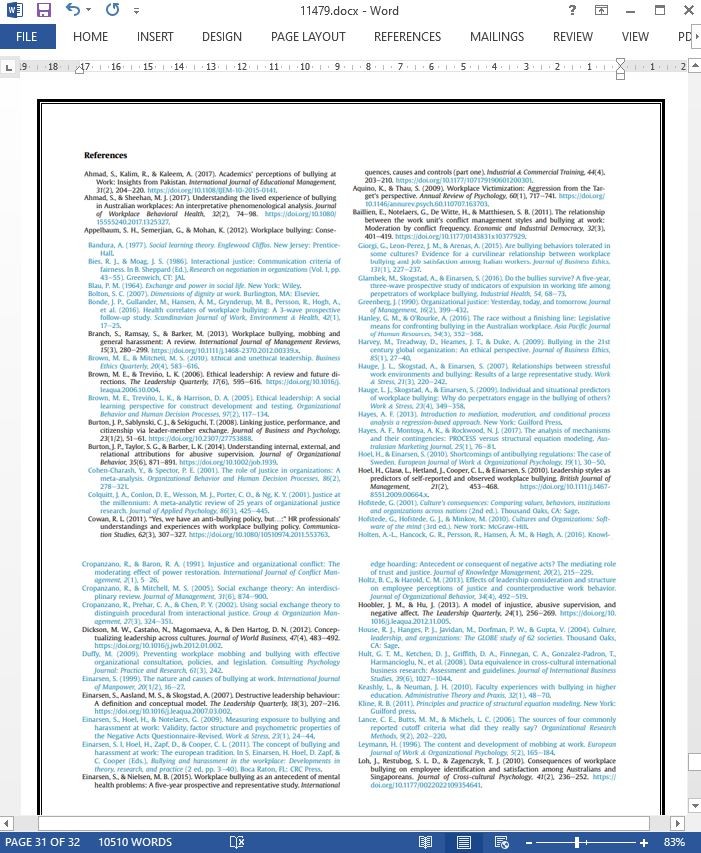
آیا رهبری اخلاقی می تواند مانع زورگویی در محل کار در سرتاسر شرق و غرب شود
چکیده
در حالی که زورگویی در محل کار به عنوان یک مسئله جدی مربوط به مدیریت در سراسر جهان شناخته شده است، ادبیات مربوط به روش های پیشگیری و مدیریت آن در تنظیمات بین المللی، کم است. این مقاله آگاهی در مورد زورگویی در محل کار را از طریق گزارش یک تحقیق در مورد اینکه چرا و چگونه رهبری اخلاقی می تواند یک سبک مدیریت موثر برای رسیدگی به این موضوع در میان فرهنگ ها باشد، افزایش می دهد. این، به منظور مفهوم سازی عدالت تعاملی به عنوان یک مکانیزم میانجی گری امکان پذیر، در تئوری های یادگیری اجتماعی و تبادل اجتماعی ترسیم می شود که با استفاده از آن زورگویی در محل کار می تواند در حضور رهبری اخلاقی کاهش یابد.
محقق، 636 کارمند با یک زمینه کاری مشابه در استرالیا (N = 306) و پاکستان (N = 330) را برای تعیین اثر بخشی بین فرهنگی چارچوب مبتنی بر رهبری اخلاقی مورد بررسی قرار داد. نتایج بدست آمده با استفاده از بررسی اثرات مستقیم و غیرمستقیم (از طریق عدالت تعاملی) رهبری اخلاقی بر زورگویی در محل کار نشان می دهند که تعداد کارکنانی که در معرض این رفتار ها قرار دارند به طور قابل توجهی کاهش یافته است زیرا رهبران اخلاقی عدالت در کار را افزایش می دهند. این مطالعه دارای پیامدهایی برای بهبود عملكرد مديريت بين المللي مربوط به زورگویی در محل كار است.
1. مقدمه
زورگویی در محل کار معمولا به وضعیتی اشاره دارد که در آن یک یا چند نفر از کارکنان ضعیف تر، مرتبا و مکررا در معرض رفتارهای غیر اخلاقی و غیر منطقی در محل کار قرار بگیرند که در این شرایط آن ها فرار یا دفاع از خود را بسیار دشوار می بینند (Branch، Ramsay & Barker، 2013؛ Einarsen، Hoel، Zapf، & Cooper، 2011؛ Harvey، Treadway، Heames & Duke، 2009). با توجه به برآوردهای معتبر بین المللی، بالای 18٪ از نیروی کار جهانی در معرض زورگویی در محل کار قرار دارند (Nielsen, Matthiesen, & Einarsen, 2010 را ببینید). تحقیقات همچنین نشان دهنده پیامدهای مضر زورگویی در محل کار، از جمله افزایش سطح استرس و افزایش غیبت و در نتیجه کاهش بازده سود دهی سازمانی و در نهایت تولید اقتصادی برای افرادی است که در معرض این رفتار ها قرار دارند (Bonde et al., 2016; Nielsen & Einarsen, 2012; Samnani & Singh, 2012). ماهیت مرسوم و پیامدهای جدی زورگویی در محل کار نشان دهنده ضرورت تحقیقاتی هستند که درک مدیریت این رفتارها را ارتقاء می بخشند (Matthiesen & Einarsen، 2010؛ Nielsen، 2014؛ Nielsen et al.، 2010). یک مطالعه اخیر نشان داده است که: "این پایداری و آسیب، به یک چالش برای رهبری سازمانی به منظور مقابله فعالانه با این مشکل و ایجاد یک تغییر فرهنگی مبتنی بر هنجارهای اخلاقی و اجرای استانداردهای اخلاقی اشاره دارد" (Ahmad & Sheehan, 2017، ص 21).
Abstract
While workplace bullying is recognised as a serious issue for management concern around the world, the literature on approaches to prevent and manage it in international settings is sparse. This paper advances knowledge on managing workplace bullying by reporting an investigation of how and why ethical leadership may be an effective management style to address this issue across cultures. It draws on Social Learning and Social Exchange Theories to conceptualise interactional justice as a possible mediating mechanism by which workplace bullying can be reduced in the presence of ethical leadership.
The researcher surveyed 636 employees working in an equivalent job context in Australia (N = 306) and Pakistan (N = 330) to determine the cross-cultural effectiveness of ethical leadership-based framing. Through the examination of direct and indirect effects (via interactional justice) of ethical leadership on workplace bullying, the findings indicated that employee exposure to such behaviour is significantly reduced because ethical leaders foster justice at work. This study has implications for improving international management practice in regard to workplace bullying.
1. Introduction
Workplace bullying commonly refers to a situation in which one or more employees of weaker power are regularly and repeatedly exposed to unethical and unreasonable behaviours at work which they find difficult to escape or defend themselves against (Branch, Ramsay, & Barker, 2013; Einarsen, Hoel, Zapf, & Cooper, 2011; Harvey, Treadway, Heames, & Duke, 2009). According to reliable international estimates, up to 18% of the global workforce is exposed to bullying at work (see Nielsen, Matthiesen, & Einarsen, 2010 for a review). Research has also shown detrimental implications of workplace bullying on those exposed to it, in the form of elevated stress levels and increased sickness absenteeism, leading to a decline in organisational productivity and, ultimately, economic output (Bonde et al., 2016; Nielsen & Einarsen, 2012; Samnani & Singh, 2012). The prevalent nature and serious implications of workplace bullying warrant research that advances understanding of the management of such behaviour (Matthiesen & Einarsen, 2010; Nielsen, 2014; Nielsen et al., 2010). A recent study observed: “Such persistence and harm suggests a challenge for organisational leadership to tackle the issue proactively and initiate a cultural change driven by moral norms and enforcement of ethical standards” (Ahmad & Sheehan, 2017, p. 21).
چکیده
1. مقدمه
1.1 بررسی ادبیات
1.2 توسعه نظریه و فرضیات
1.3 عدالت تعاملی و زورگویی در محل کار
1.4 نقش واسطه ای عدالت تعاملی
1.5 طراحی این مطالعه
1.6 معیارها
1.7. متغیرهای کنترل
1.8 استراتژی های تحلیلی و نتایج
2. بحث
2.1 مشارکت های نظری
3. مفاهیم عمل
3.1 محدودیت ها و راه های پژوهش آینده
Abstract
1. Introduction
1.1. The literature review
1.2. Theory and hypotheses development
1.3. Interactional justice and workplace bullying
1.4. The mediating role of interactional justice
1.5. The design of present study
1.6. Measures
1.7. Control variables
1.8. Analytical strategies and results
2. Discussion
2.1. Theoretical contributions
3. Practice implications
3.1. Limitations and future research avenues
- اصل مقاله انگلیسی با فرمت ورد (word) با قابلیت ویرایش
- ترجمه فارسی مقاله با فرمت ورد (word) با قابلیت ویرایش، بدون آرم سایت ای ترجمه
- ترجمه فارسی مقاله با فرمت pdf، بدون آرم سایت ای ترجمه



